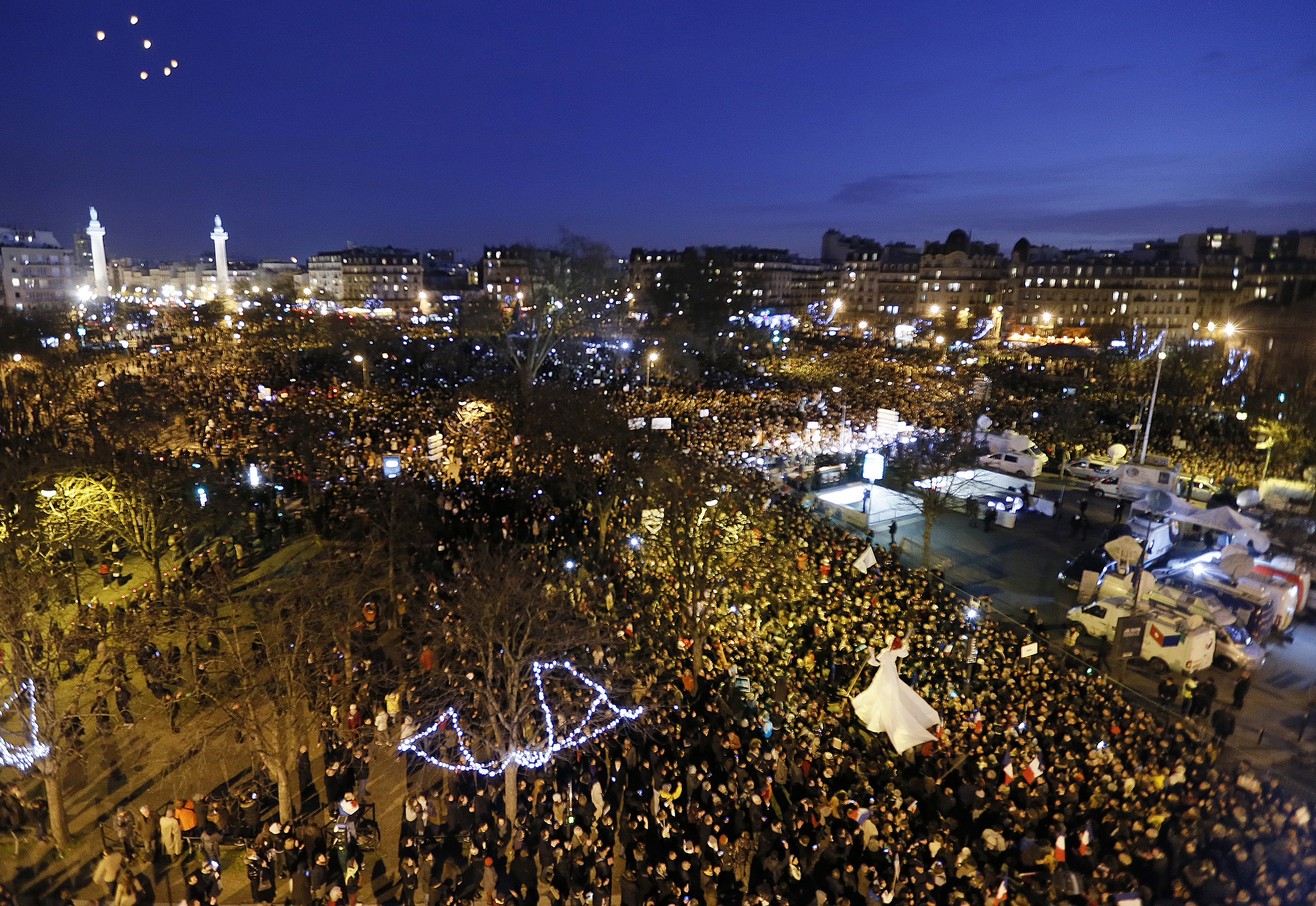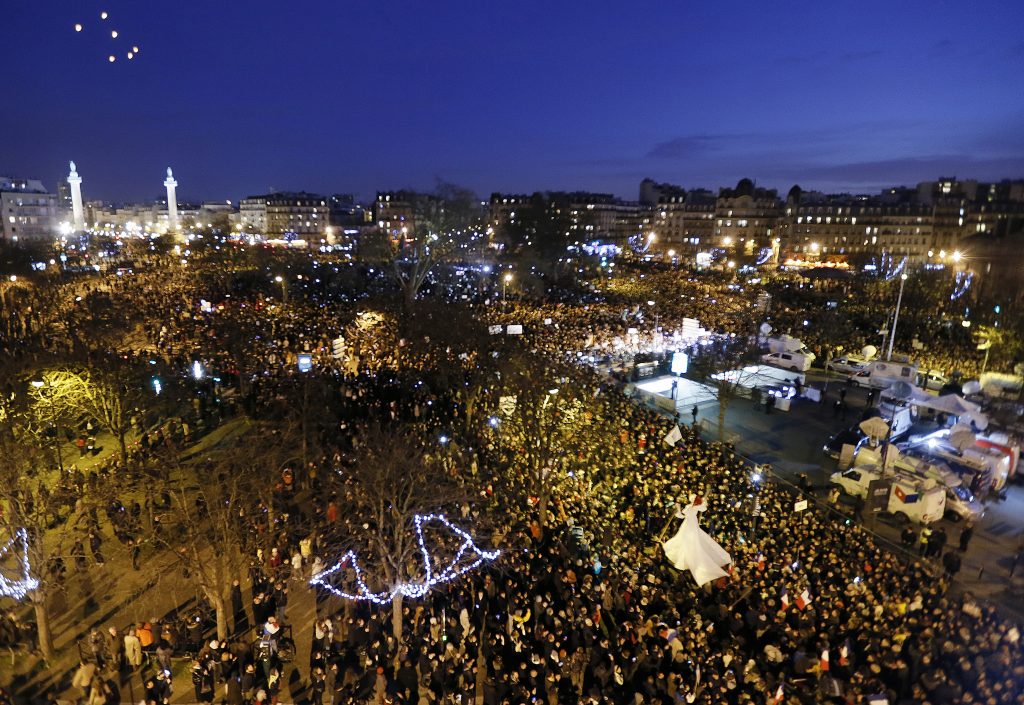
French Response to Islamist Violence Reflects Political Values and a Sense of National Mission
France’s people and leaders have shown a unity and dignity following last week’s terrorist attacks that honor the country’s political culture of tolerance and reaffirm its success in confronting terrorism. France thus constitutes a valuable role model for other democracies and remains a steadfast ally on the front line in thwarting extremist violence.
More than a million French citizens of all backgrounds took to the streets January 11, particularly in Paris, where they were joined by the entire political class except the extreme right National Front and by the most impressive gathering of world leaders to walk together in public since the funeral of John F. Kennedy half a century ago. In standing side-by-side in the open, the French were showing their family feeling as a nation. Close family ties are more precious in France than in any other western country and the French as a people often react to events like a large family. When the French speak of La République, they are not just talking about a form of government but about a set of national family values. Those values—liberté, égalité, fraternité—have all been on constant display since the attacks, and poignantly reflected in the comments of many ordinary French citizens interviewed by the world’s media.
France has the largest Muslim population of any country in Europe, at 6 million or one tenth of the French people, as well as the largest Jewish population of any European country, at 600,000. President François Hollande, Prime Minister Manuel Valls and manifold other officials have gone out of their way this week to mark their respect for both communities, especially since one of the terrorist attacks targeted a kosher market. In response to expressions of concern from Israel and other Jewish sources, Valls reaffirmed that France would not be France without its Jewish citizens. The brother of one of the terrorist assailants, in a moving interview, himself reaffirmed that violence and hatred run counter to Islam. Tolerance and the values of La République prevailed.
Maintaining France’s national unity will require political will and popular support. Former president Nicolas Sarkozy, again the head of the main opposition party, the Union for a Popular Movement, could himself undermine that unity if, as in the past, he is inclined to appeal to the electorate of the National Front and adopt some of its hard-line, divisive positions.
Yet very much in evidence so far has been a sense of restraint, rather than outrage, panic, hatred or vengeance. Europe has lived with home-grown terrorism for years, without over-reacting or undermining democracy, from 19th century anarchists to the post-World War II left-wing Baader-Meinhof Gang and Red Brigades. France has seen home-grown terrorism from right-wing extremists during the Algerian war and the left-wing Action Directe in the 1980s. From June to October of 1995, eight bombings in Paris, including one at the Saint-Michel underground railway station near Notre Dame, killed eight people and injured 117—all linked to the Algerian Groupe Islamique Armé. The Salafists of al Qaeda in the Islamic Maghreb have been on French radar screens for years.
Terrorism at home has not daunted French courage to combat it wherever it is found. French pilots were strapped in ready to bomb Syria after the revelations of Bashar al-Assad’s use of chemical weapons, until the British government backed down after a shambolic House of Commons vote and President Barack Obama declined to act without an approval from Congress which he did not legally need.
France is said to be “at war” with al Qaeda and ISIS. France considers that it has a universal mission to defend human rights when it can do so with the support of local leadership and in accordance with international law. France’s military operation in Mali, underway since 2013, has been a thoroughly professional intervention that put down the revolt by ethnic Tuaregs and eradicated Islamist militants infiltrating Mali from Libya. French forces are engaged in the United Nations-authorized International Support Mission to the Central African Republic to counter the destabilization of that country following a coup and communal warfare.
The goal of French foreign and military policy is expressed in two words: indépendance nationale. France has the second-largest diplomatic representation in the world, surpassed only by the United States. The whole range of politicians and the public in France support a strong global role for their country backed up by resolute, full-spectrum military force. France insists on maintaining an independent defense industry based on French engineering and technology. At the 20th Parliamentary Defense Meetings in Paris last October, the Socialist deputy chair of the National Assembly Defense Committee, Nicolas Bays, gave a rousing paean to France’s armed forces, heavily applauded by civilians and military alike.
No NATO ally of the United States is more prepared than France to safeguard security at home and to project power abroad, or more determined to do so in accordance with the legitimacy conferred by its political values and by respect for international law.
Nicholas Dungan is a non-resident senior fellow in the Atlantic Council’s Transatlantic Relations Program, a senior advisor to the Institut de Relations Internationales et Stratégiques in Paris and an adjunct faculty member at Sciences Po.
Image: Hundreds of thousands of French citizens mass in the streets of Paris January 11, where they were joined by foreign leaders, including Arabs and Muslims, to protest the killings by Islamist terrorists of journalists, police and others in Paris last week. (Reuters/ Gonzalo Fuentes)
